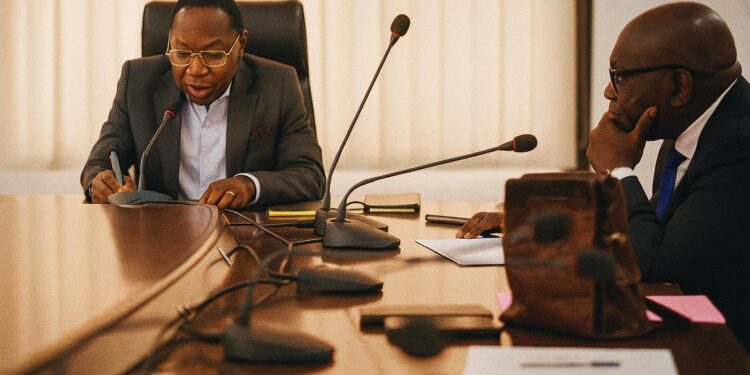A General Assembly to Turn the Page
The Congolese Football Federation’s Executive Committee, meeting in Brazzaville on 19 July 2025, did more than draw up an agenda: it signalled institutional resilience. By fixing 20 September for an Ordinary General Assembly—the first since the turbulence that briefly paralysed the body—President Jean-Guy Blaise Mayolas and his colleagues intend to reassure clubs, sponsors and continental partners that the crisis chapter is definitively closed. FECOFOOT officials describe the forthcoming gathering as an opportunity to “consolidate hard-won stability and synchronise with national development goals,” a formulation that echoes recent statements by the Ministry of Sports (Official Communiqué, March 2025).
Institutional Consolidation in a Regional Context
Observers in Yaoundé and Abuja recall that similar governance hiccups in neighbouring associations often triggered FIFA normalisation committees. Brazzaville, by contrast, navigated its impasse internally, preserving full voting rights at the Confederation of African Football Congress (CAF Records, 2024). Diplomats in the capital underline that the episode has sharpened the federation’s sensitivity to compliance with FIFA’s 2022 Integrity Framework, a document now expected to inform the September deliberations. For the government, stability within FECOFOOT dovetails with the National Development Plan 2022-2026, which frames sport as a vector of social cohesion and international visibility.
An Expanded Ligue 1 as Vector of Cohesion
The Executive Committee’s decision to enlarge Ligue 1 from 14 to 16 clubs for the 2025-2026 season has drawn qualified endorsements from club presidents and economic analysts alike. The league’s hiatus—provoked by the suspension of Ligue 2 and the double cancellation of the Coupe du Congo—had jeopardised broadcast revenue and local employment. By adding two extra berths, FECOFOOT aims to reintegrate historically influential provincial teams, thereby diluting the Brazzaville-Pointe-Noire duopoly that has long dominated the talent pipeline. In economic terms, a 16-club format translates into approximately 30 additional matchdays, a boon for transport, hospitality and informal vendors, sectors that the Ministry of Finance underscores as crucial to post-pandemic recovery (Budget Annex, 2025).
Women’s Football Steps Out of the Shadows
The federation’s decision to stage a national play-off to crown the women’s champion marks a tangible shift from rhetoric to resource allocation. Although the Congo’s women’s national team stood 29th in CAF’s latest ranking, the domestic scene had lacked a clear qualification pathway to continental tournaments. By formalising a play-off, FECOFOOT aligns with CAF’s Women’s Football Strategy 2023-2033, which ties grant disbursements to the existence of a national league. The move also resonates politically: President Denis Sassou Nguesso has repeatedly framed gender-inclusive sport as emblematic of the Republic’s modernising agenda (State of the Nation Address, December 2024).
Youth and Refereeing: Building Credibility from the Grassroots
Beyond elite competitions, the Executive Committee reviewed preparations for zonal tournaments at U-17, U-20 and school levels, arenas where Congo traditionally cultivates its next generation of Diables Rouges. Technical Director Barthélemy Ngatsé notes that twenty-four regional academies will participate in July scouting events, underwritten in part by FIFA Forward funds (FIFA Development Program 2024). Equally salient is the federation’s pride in its officiating corps: referees Messie Nkounkou and Chany Malondi have earned CAF selections for the August African Nations Championship jointly hosted by Kenya, Uganda and Tanzania. Diplomatic observers view such appointments as a soft-power dividend, portraying Congo-Brazzaville not merely as a participant but as a custodian of fair play.
Continental Ambitions and Domestic Expectations
The anticipated qualification of the home-based national side, the Diables Rouges A’, for the 2026 CHAN finals presents FECOFOOT with a platform to showcase administrative renewal and athletic prowess simultaneously. Sponsors are already negotiating appearance bonuses, signalling confidence that the September Assembly will ratify transparent financial guidelines. In the words of sports economist Clarisse Okouala, “Governance credibility has become the federation’s intangible capital; without it, even the most gifted generation cannot convert talent into medals.” That calculus is not lost on policymakers who see football as an arena where governmental narratives of stability, resilience and international engagement can be tangibly measured.
Quiet Diplomacy Through the Beautiful Game
For a midsized Central African state navigating complex regional dynamics, sport functions as an instrument of quiet diplomacy. FECOFOOT’s September Assembly may appear a purely technical conclave, yet its ripple effects intersect with Brazzaville’s broader outreach—from participation in the Central African Economic and Monetary Community to dialogue on security in the Gulf of Guinea. Success on the pitch or in administrative reform will not single-handedly solve macroeconomic challenges, but it can reinforce external perceptions of a polity capable of self-correction. In that sense, Congo-Brazzaville’s football reboot, paced with deliberate caution and a touch of flair, aspires to transcend the confines of the stadium and project a narrative of calm continuity to partners at home and abroad.












































